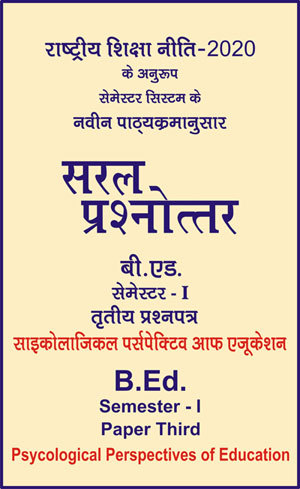|
बी एड - एम एड >> बी.एड. सेमेस्टर-1 प्रश्नपत्र-III - साइकोलाजिकल पर्सपेक्टिव आफ एजूकेशन बी.एड. सेमेस्टर-1 प्रश्नपत्र-III - साइकोलाजिकल पर्सपेक्टिव आफ एजूकेशनसरल प्रश्नोत्तर समूह
|
5 पाठक हैं |
|||||||
बी.एड. सेमेस्टर-1 प्रश्नपत्र-III - साइकोलाजिकल पर्सपेक्टिव आफ एजूकेशन (अंग्रेजी भाषा में)
Question- What is the role of Infant’s Cognitive in Education.
Answer-
Infant’s Cognitive Education
It is evident from the foregoing consideration of infant’s mental characteristics that the teacher must pay the utmost attention to his development in the process of education. It is for the teacher to arouse the curiosity of the infant in any subject that he wishes to teach. Once this is achieved, the teacher can confidently leave it to the infant’s enthusiasm to understand the lesson properly. Whatever the nature and irrelevance of the question that an in fant asks, he should never be irritably reproved. A teacher must do all in his power to answer each and every question that an infant puts.
-
Use of instincts in teaching : The infant’s education should be based on his instincts. If the infant’s self-respect is injured, his tendency to self-assertion is seriously impaired. Sympathetic and loving behaviour can induce the infant to surrender to the teacher and honour his discipline. An infant’s enthusiasm should never be suppressed as it may lead to the formation of mental complexes.
-
Teaching through Actual Objects : As the infant normally attends toowards imaginative wanderings the teacher should employ concrete objects in training and teaching him. Although it is essential that the infant’s imagination, and particulary aesthetic imagination be activated through dance, music, painting, etc., his formal education should be conducted through the use of concrete things such as wooden blocks etc.
-
Importance of Sympathetic and Loving Behaviour towards the Child : Modern psychologists unanimously opine that the behaviour or a teacher towards the infant should be one of sympathetic understanding and love. If the infant works to his satisfaction, it should be encouraged further by kindly words of praise.
-
Need for making the child self-reliant : Understanding of important’s cognitive development makes it evident the teacher should do his best to provoke self-reliance among his students. In fact, in modern democratic societies, the very aim of education is to make the child self-reliant and independent individual. For this it is essential that he be given small minor tasks to perform on his own initiative. He can be assisted in the process of flearning but this assistance should take the form of guidance and should never be so excessive as to render the infant utterly dependent upon the adviser. Actually, the duty of the teacher lies in looking after him as he develops himself, not to develop the infant, whose intelligence, mental abilities, and memory and other capacities develop of their own accord as he grows older. It is upto the teacher to satisfy the needs of the infant that arise during this process of development. And for this, it is essential to develop the right kind of atmosphere in the school since once this main task is achieved successfully, the teacher’s function is reduced to one of intelligent participation and supervision. The atmosphere depends upon the presence of games and toys, attractive and interesting curriculum, healthy school rooms and the right adjustment in the mutual relations between the teachers and students, and the students themselves.
Keeping in view all that has been said above, modern school are seen employing the latest methods of education and experimenting with them. Western countries are making increasing use of radio and television in the education of infants. The programme is varied when infants are taken to view educationally important films. The infant’s stock of knowledge is increased by taking him to new gardens, exhibitions, historic and other interesting places. Communal qualities are generated in the child by encouraging participation in collective programmes that are organised in the school. In this manner, the modern teacher who is at all knowledgeable, keeps in kind the mental development of the infant and tries to set the educative process to conform to the infant’s mental mould.
|
|||||














